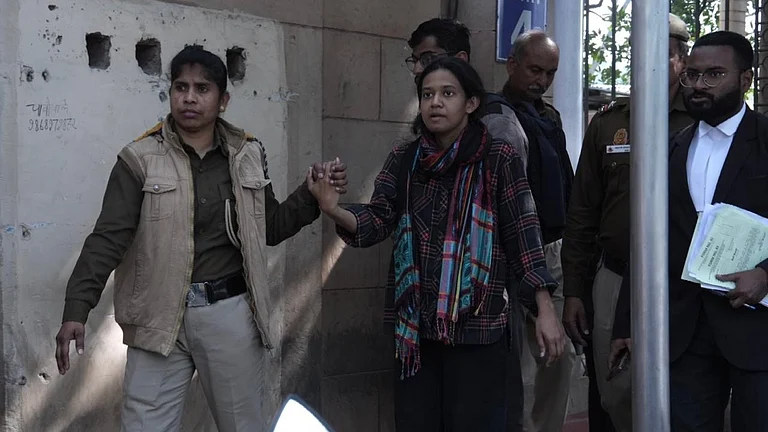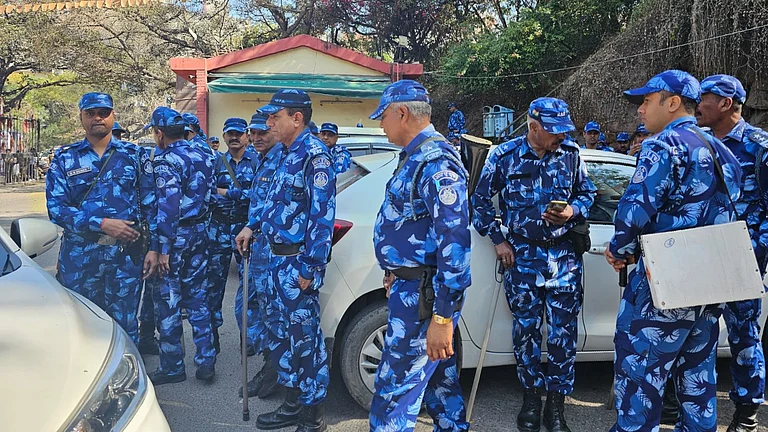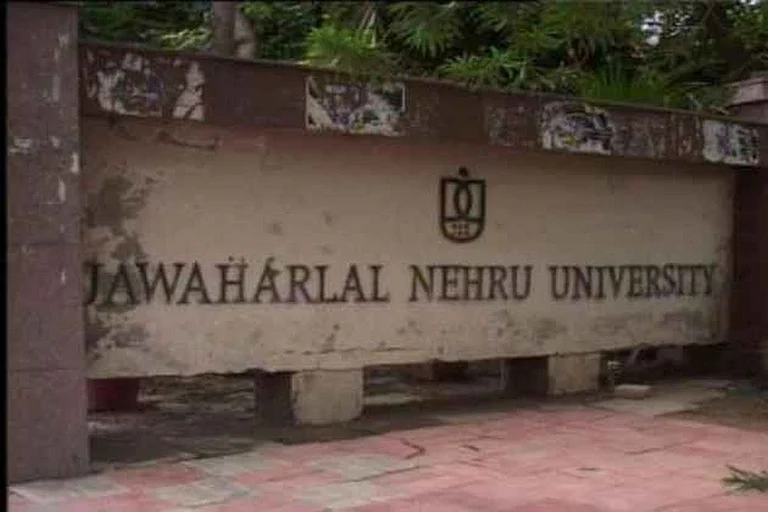
Summary of this article
Six JNUSU presidential candidates clashed over ideology, governance and campus issues at the JNU debate.
Voting for the students’ union takes place on November 4, with results due on November 6.
The debate featured sharp exchanges between the Left alliance, ABVP, NSUI, PSA, DSO and independents.
As slogans reverberated and lights dimmed at Jawaharlal Nehru University, the campus turned into a charged space of conviction and debate. The presidential debate, regarded as the most crucial event in the JNUSU election season, drew a packed audience on Sunday night, with six candidates presenting their manifestos and competing visions of India, reported PTI.
“Every JNUSU election is a rehearsal for democracy,” said a doctoral student seated at the back. “It reminds us that politics begins with words, and sometimes, with the courage to speak them.” Voting for the students’ union will take place on November 4, with results to be declared on November 6.
The debate marked the campaign’s climax, the final exchange before the silence period began. The Left alliance, Akhil Bharatiya Vidyarthi Parishad (ABVP), National Students’ Union of India (NSUI), Progressive Students’ Association (PSA), Disha Students’ Organisation (DSO) and independent candidates took turns addressing the crowd, each asserting that they represented the “real voice” of JNU.
Representing the Left alliance, Aditi Mishra, a PhD scholar from the School of International Studies, appealed to extend solidarity beyond campus issues.
“We will continue to raise our voice for Palestine, for Kashmir’s statehood, for Ladakh’s environment and for the release of Sonam Wangchuk,” she said.
Mishra accused the ruling dispensation of “attacking the very idea of India,” citing bulldozed homes, the arrests of activists Umar Khalid and Sharjeel Imam, and what she described as a “shrinking space for dissent.” Referring to Sadhvi Pragya’s controversial remarks about ‘breaking girls’ legs’, she called it “a symptom of how hate has replaced humanity.”
“The unemployed youth are being told to search for temples in mosques instead of jobs,” she added, quoting poetry to murmurs of approval from the audience.
Her main opponent, ABVP’s Vikas Patel, framed the contest as a referendum on decades of Left dominance on campus.
“The campus is tired of Left politics. For 50 years they have ruled and ruined,” he said, drawing chants and interruptions.
Patel accused the Left of working in concert with the university administration. “There are barricades all around JNU because of their nexus with the administration. Their fourth partner is the JNU administration itself,” he remarked, prompting laughter and heckles.
He further alleged hypocrisy in the Left’s leadership structure. “There is not a single woman or Dalit in the Left’s politburo,” Patel said. “They talk of equality, but their practice betrays it. Only ABVP works for students all year, not just during election week.” Citing national issues, he called the 1975 Emergency “a black spot on democracy.”
NSUI’s candidate Vikash said both the Left and the Right had “looted the real issues” of the university. “The binary of Left and Right has robbed JNU of its real agenda — fellowships, research funding, hostel safety. The Left has destroyed the campus and the Right thrives on that destruction,” he argued.
The Progressive Students’ Association (PSA) candidate, Shinde Vijayalaxmi Vyankant Rao, delivered one of the night’s most fiery addresses. She tore a copy of the Chief Proctor’s Office (CPO) manual on stage, calling it “a symbol of surveillance, not safety.”
“Barricades are everywhere in this campus but not around justice,” Rao said. “There’s space for RSS parades but not for protest gatherings. We are told to be second-class citizens in our own country.” Quoting poet Bashir Badr, she added: “Log toot jate hain ek ghar banane mein, tum taras nahin khate bastiyan jalaane mein.”
Rao linked issues of nationalism, environment, and social justice, criticising the government’s approach to development. “These people call GST on a coffin a masterstroke,” she said. “Businessmen are gifted forests in the name of ‘ek ped maa ke naam’. Is this the India we dreamt of?”
Independent candidate Angad Singh focused on immediate student concerns. “I will care for Gaza, Nepal or Bangladesh after fixing the falling ceilings on students,” he said, to applause from sections of the crowd. “When will your struggle end? You fight elections, but the answer to every problem is ‘the administration is to blame’. Then why do you fight at all?”
Disha Students’ Organisation (DSO) candidate Shirshava Indu raised issues of academic stress and the environment, linking them to policies such as the Four-Year Undergraduate Programme (FYUP) and rising dropout rates.
This year, the Left Unity — comprising AISA, SFI and DSF — is contesting jointly after a gap, fielding Aditi Mishra (President), Kizhakoot Gopika Babu (Vice-President), Sunil Yadav (General Secretary) and Danish Ali (Joint Secretary). The ABVP’s panel includes Vikas Patel (President), Tanya Kumari (Vice-President), Rajeshwar Kant Dubey (General Secretary) and Anuj (Joint Secretary).
In the 2023 polls, AISA’s Nitish Kumar won the president’s post, while ABVP’s Vaibhav Meena secured the Joint Secretary seat — the organisation’s first in a decade, which it described as a “historic shift.”
Students say this year’s campaign has revived memories of the “old JNU,” filled with songs, slogans and spirited debate. “The debate reminded us why JNU matters,” said a student from the Centre for Political Studies. “You may disagree with every word spoken, but you still listen. That’s democracy.”
Campaigning ended on November 3, ushering in the mandatory silence period. As posters fade and pamphlets curl in the wind, anticipation on campus remains high.
The JNUSU elections, often called the “mini-parliament of Indian campuses,” have long mirrored the country’s ideological contests between nationalism and dissent, faith and freedom. As another doctoral student put it while leaving the venue, “Every JNUSU election is a rehearsal for democracy because it reminds us that before power, there must be dialogue.”
(With inputs from PTI)






















